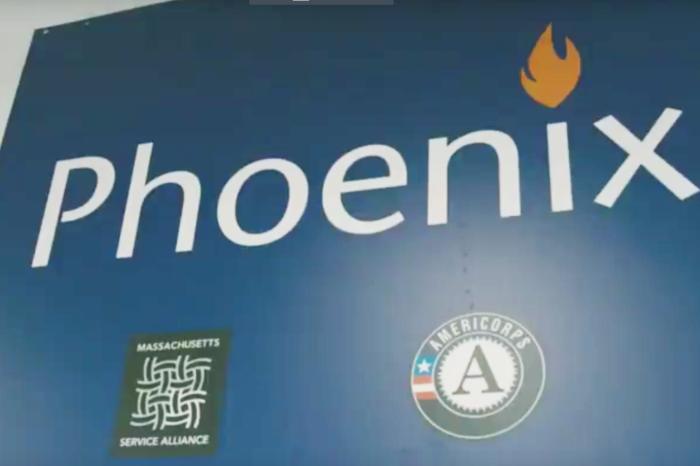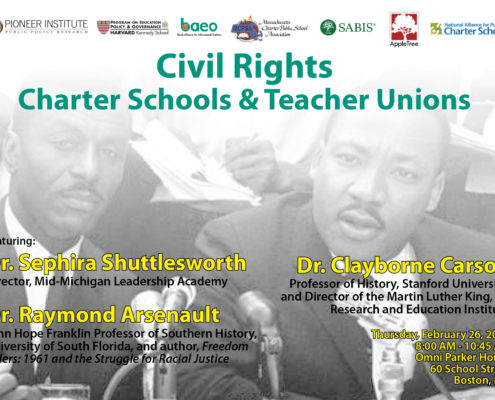How Phoenix Academies Transform Potential High School Dropouts into College Grads
Study Explores How Phoenix Academies Transform Potential High School Dropouts into College Graduates
Network combines second chances and individualized support with academic rigor
BOSTON – A network of three Massachusetts public schools is using “relentless support” to help at-risk students not only graduate from high school, but also succeed in college, according to a new study published by Pioneer Institute.
In Massachusetts Charter Public Schools: Best Practices from the Phoenix Charter Academies, author Cara Stillings Candal writes that during the 2014-15 school year, more than 86 percent of Phoenix Academy students were teen parents, court-involved, highly truant, English language learners, received special education services, or had already dropped out of high school.
“The Phoenix Academies network proves that with patience, flexibility and individualized support, students who are most at risk of dropping out of high school can become college graduates,” said Pioneer Institute Distinguished Senior Fellow in Education Tom Birmingham, who also authored a preface to the study.
The network includes charter public schools in Chelsea and Springfield. Phoenix’s Lawrence Academy is not a charter school. The Phoenix network was invited in to assist with turnaround efforts after the district was placed in state receivership in 2011.
When the first Phoenix Charter Academy opened in Chelsea in 2006, a number of Massachusetts charters were already achieving great success with an educational model of high standards and high expectations for students. Phoenix founder, Beth Anderson, saw great potential for all students in this model but knew that at-risk students would need specialized supports to master high standards and rise to high expectations.
The Phoenix Academies enroll students quarterly to more effectively capture those who are at risk of leaving school. Once at Phoenix, an Attendance Transformation Team identifies cohorts of students who struggle with the motivation to come to school on a regular basis, crafting and implementing individualized plans for each one.
Student Support Teams build scholarly habits in students, even if doing so requires showing up at their homes. One-on-one and one-on-two tutoring is also provided, as well as explicit literacy support.
Little Scholars Centers, which are free to Phoenix students who are also parents, provide free on-site daycare and/or preschool. For many teen parents, these Centers make the difference between staying in school and dropping out.
As one Phoenix student said, “It’s like they’re always on your back. After a while, you start to realize that it’s because they have your back.”
Another part of the relentless support is eschewing traditional grade levels that are based on seat time in favor of a system that allows students to progress at their own pace. The challenges these students – many of whom are older than traditional high schoolers – face can cause some to miss chunks of time or have inconsistent attendance records.
Nationwide, only 4 percent of alternative programs for high school students offer college-level work, but Phoenix Academies offer Advanced Placement courses, dual enrollment college classes and SAT prep. Phoenix has had several years in which every graduate went on to post-secondary education.
Amazingly, the academies provide 90 percent of their services with the money they receive as public schools. They use state and federal grants and private fundraising to support the Little Scholars Centers.
One reason Phoenix Academies have been able to achieve so much is through partnerships. AmeriCorps fellows work as members of the Attendance Transformation and Student Support Teams and also tutor students. The schools also partner with school districts, mental health groups and other community organizations.
Unlike other Massachusetts charter schools that are viewed with hostility by their traditional counterparts, Phoenix has a collaborative relationship with surrounding school districts. One important reason is because its academies serve those for whom traditional public schools haven’t succeeded.
Chelsea Superintendent Mary Bourque notes that Phoenix offers different resources, such as the on-site daycare, the opportunity for students to progress at their own pace, and, in some cases, smaller class sizes. She will refer at-risk students who can benefit from these services, or who are looking for a different option, to Phoenix.
Among Candal’s recommendations are increasing the current cap on charter schools and eliminating the provision that requires many new schools to be run by “proven providers.” The limitation is a disincentive to innovative approaches like the one employed by Phoenix.
She also recommends that the state Department of Elementary and Secondary Education look at school turnaround partnerships like the one between Lawrence and Phoenix very closely and determine whether autonomies that have played a role in their success could be applied to all public schools.
About the Author: Cara Stillings Candal is an education researcher and writer. She is a senior consultant for research and curriculum at the Center for Better Schools/National Academy for Advanced Teacher Education, an adjunct professor at the Boston University School of Education, and a senior fellow at Pioneer Institute.
About the Preface Author: Tom Birmingham is the Distinguished Senior Fellow in Education at Pioneer Institute. He was previously the Executive Director of Citizen Schools Massachusetts and Senior Counsel with Edwards Wildman Palmer LLP. In 1991, Mr. Birmingham was elected to the Massachusetts State Senate, where he served as co-chair of the Joint Committee on Education. He was one of the architects of the landmark 1993 Massachusetts Education Reform Act. Mr. Birmingham later served as Chairman of the Senate Committee on Ways and Means and Senate President. Mr. Birmingham graduated from Harvard College and Harvard Law School and is a Rhodes Scholar.
Pioneer Institute is an independent, non-partisan, privately funded research organization that seeks to improve the quality of life in Massachusetts through civic discourse and intellectually rigorous, data-driven public policy solutions based on free market principles, individual liberty and responsibility, and the ideal of effective, limited and accountable government.
Get Updates on Our Charter Schools Initiative
Related posts:

















